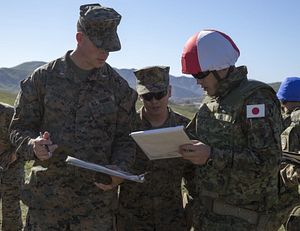For five weeks, 270 Japanese soldiers from the Ground Self-Defense Force (GSDF) Western Infantry Regiment, along with other units, will participate in an annual, bilateral amphibious training exercise, codenamed Iron Fist, jointly held with the United States Marine Corps (USMC) at Camp Pendleton in southern California.
The goal of the exercise, which will include combat marksmanship, military planning, and fire support operations, is to train the GSDF and USMC in combined amphibious operations, according to a U.S. Department of Defense press release. “Since 2006, Exercise Iron Fist has enabled Japanese soldiers to train with U.S. Marines on American soil to improve the planning, communications, and conducting of combined amphibious operations,” said USMC Colonel Clay C. Tipton, commanding officer of the 11th Marine Expeditionary Unit. “In the short span of a decade, this exercise has allowed our two services to come together and practice amphibious operations at the platoon, company and battalion level.”
Japan wants to set up its first Amphibious Rapid Deployment Brigade by the spring of 2017. The initial size of the brigade will be around 2,000 troops, but this is slated to increase to 3,000 once the force becomes fully operational sometime in 2018. The new brigade’s principal mission will be to defend the 6,000 islands and islets of the Ryukyu Islands chain, which stretches southwest from Kyushu to Taiwan.
The Western Army Infantry Regiment, based in Sasebo in Nagasaki Prefecture, will be the nucleus of this new force. Seven hundred troops of the light infantry regiment are currently charged with defending the remote islands. However, the establishment of the new unit has been plagued by inter-service rivalry, budgetary constraints, and the Japan Self-Defense Force’s traditional problem of a lack of inter-service coordination, which, given that any amphibious warfare operation will require all three services to cooperate, may prove particularly problematic.
“I have been looking forward to this opportunity to train with the Marines here for a long time,” said Japanese Colonel Yoshiyuki Goto, the commander of the Western Army Infantry Regiment. “Marines are very quick to make changes that are necessary to improve the quality of training. I recognize the U.S. Marines’ speed and flexibility is required for amphibious operations to be successfully completed.”
The Japanese soldiers will spend the first couple of weeks at the USMC Base Camp Pendleton, followed by a stint at the USMC Air Ground Combat Center Twentynine Palms,where the soldiers and marines will conduct live-fire ranges and company level bilateral attacks. “The final phase of training will see Japanese soldiers and U.S. Marines embark on the USS Somerset (LPD 25) and conduct ship-to-shore movements, a Supporting Arms Coordinating Center Exercise (SACCEX), and a battalion level Amphibious Landing Exercise (PHIBLEX),” the press release states.
“SACCEX will have our [Japanese] soldiers and [U.S.] Marines executing an amphibious movement to San Clemente Island, then executing fires with rotary wing, fixed wing and indirect fire weapons,” explains Colonel Tipton.
“PHIBLEX is the culminating training evolution,” he added. “This is where the previous four weeks of training will pay dividends. Japanese soldiers and U.S. Marines will be coming off the USS Somerset in Amphibious Assault Vehicles and Landing Craft Air Cushions to conduct an amphibious assault, which will transition to a ground operation to secure an inland objective.”
“We recognize the capabilities for rapid response, emergency situation, and conflict prevention of an amphibious rapid deployment brigade,” emphasized Colonel Goto. “Using the exceptional training environments on Camp Pendleton, it will really enhance our capabilities to conduct amphibious operations with the U.S. Marine Corps.”

































